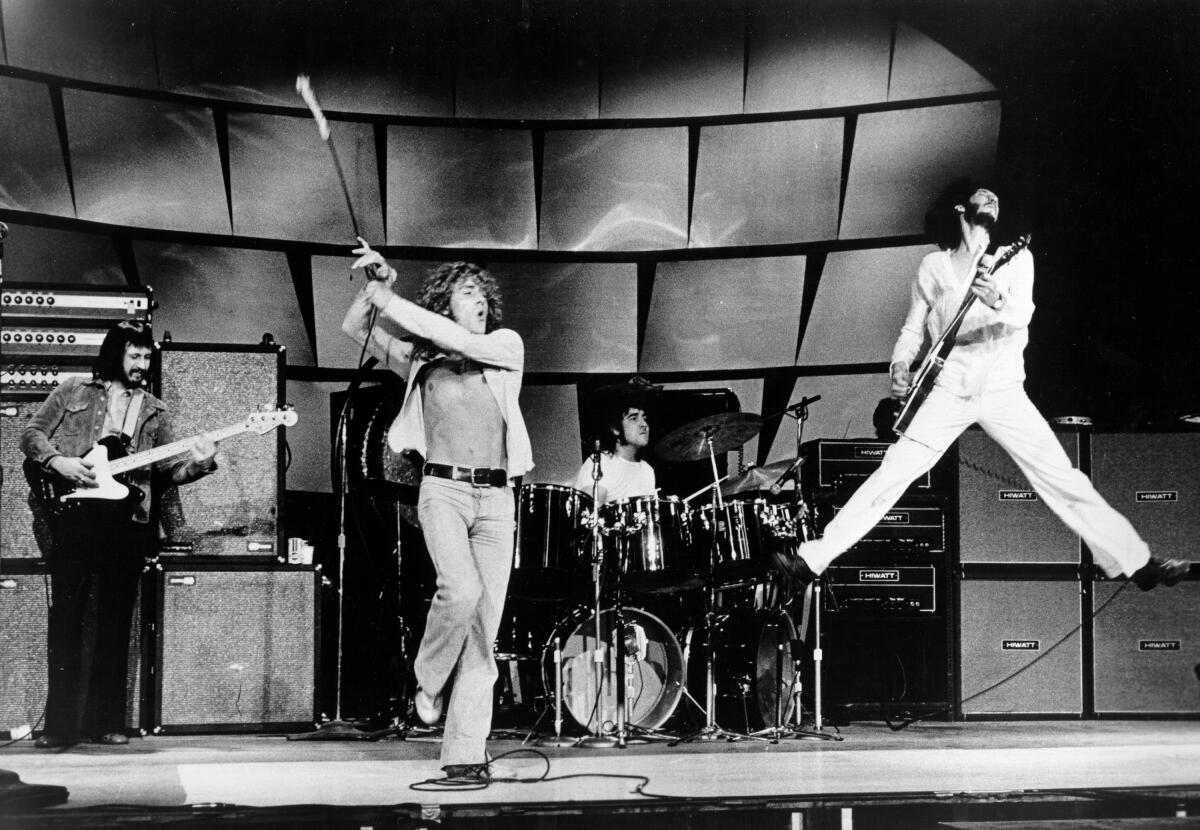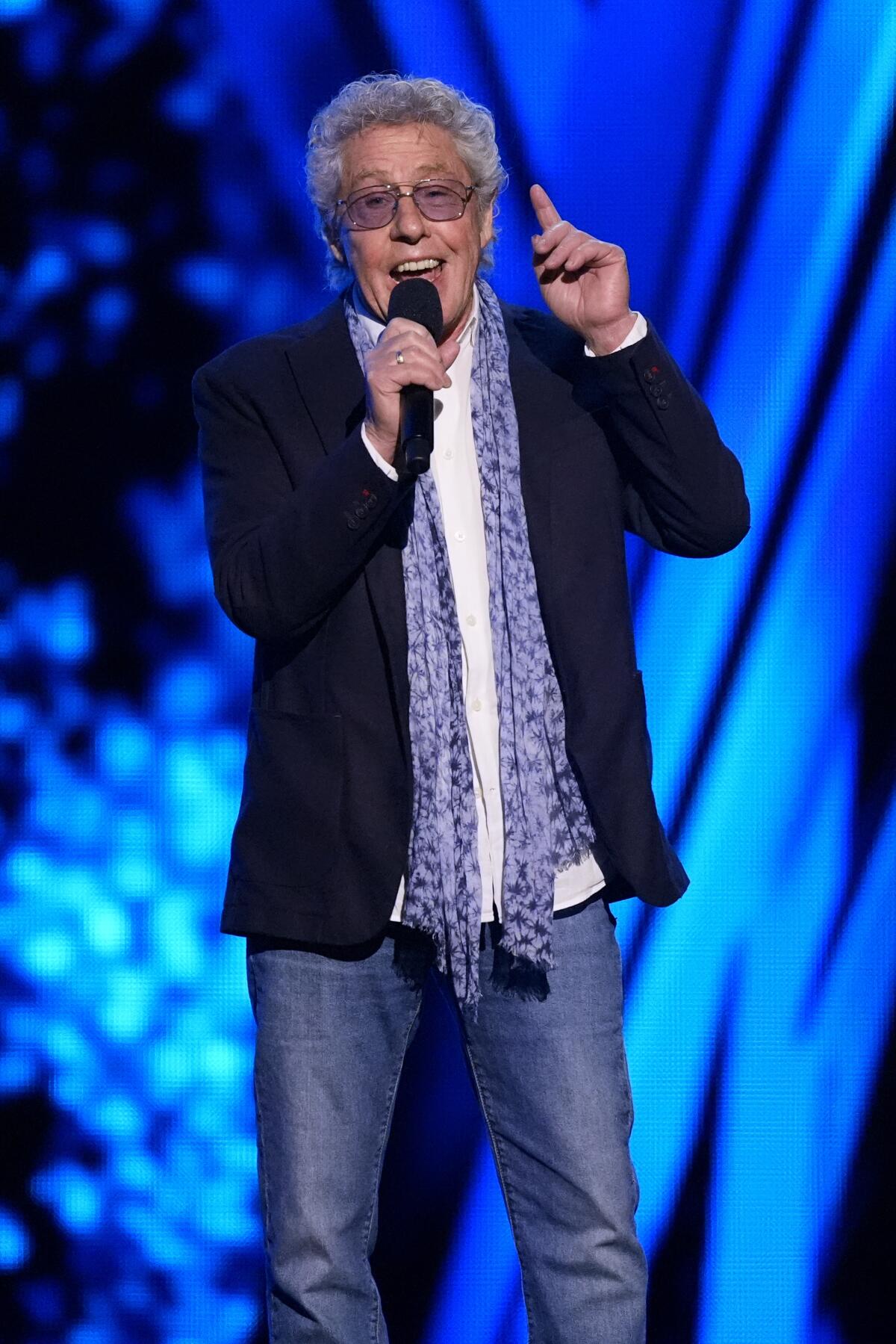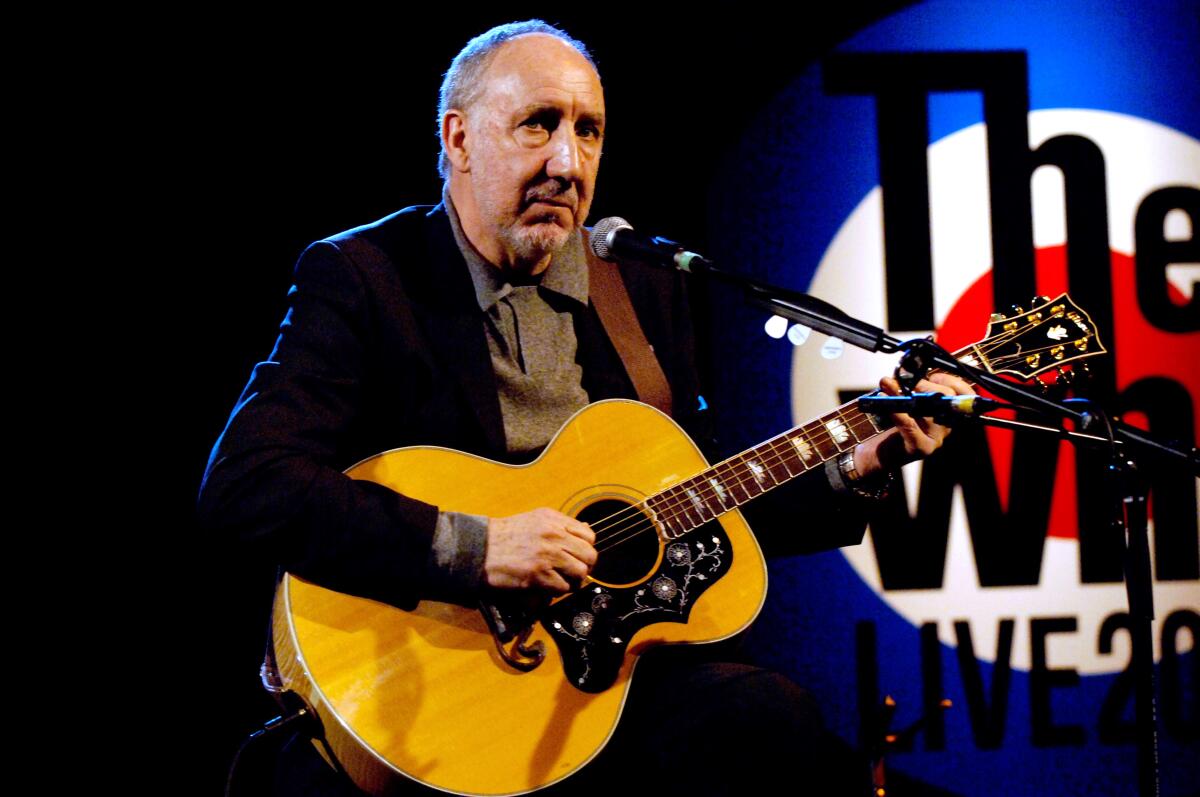Sixty years ago, British music was hugely popular in America. While the Beatles and Rolling Stones led the way, groups like the Kinks, Dave Clark Five, Herman’s Hermits, and the Animals were also touring and gaining fans across the country.
The Who didn’t arrive in the US until 1967, even though they had already released several songs that would become classics. Despite internal conflicts, the tragic loss of two members, and even a song about hoping to die young, the band continues to perform and rock stages today.
After hinting at retirement for over forty years, the band is playing what might be their final shows at the Hollywood Bowl on Wednesday and Friday. It’s called ‘The Song Is Over’ tour, but whether it truly is their last tour remains to be seen.
Pete Townshend, the guitarist and songwriter, is currently focused on enjoying performing and creating great music. He wants to appreciate the present and the opportunity to share his work with audiences.
Roger Daltrey and I have been talking about a farewell tour, as well as our health and future plans, in many interviews. We’ve really enjoyed reflecting on our early experiences and how much America, especially California, has meant to us since our first visit.
Townshend recently shared in an interview that while it arrived later than expected, this development was something they had always wanted and represented a significant and exciting experience. He offered detailed and thoughtful memories of those early times.
Born in 1944 during World War II, we grew up with food rationing – we ate simple foods like suet, while America seemed to have plenty. For those of us born around that time, achieving success in America was the ultimate goal. It felt like a dream world, and in the beginning, all our music was inspired by American artists – we were essentially copying their style.

Townshend, rarely one to fully agree, acknowledged that musicians and music fans alike were deeply indebted to America. He cited the influence of American blues, Motown, New Orleans jazz, folk music, and especially the groundbreaking ‘Pet Sounds’ album by the Beach Boys, which he felt was revolutionary.
In 1967, The Who toured the United States twice. They first played a show in New York in the spring, and then returned for a more extensive tour throughout California and the rest of the country during the Summer of Love.
Townshend recalls that being in New York and staying at the luxurious Drake Hotel, where a steak dinner cost around fifty dollars, felt incredibly glamorous. He says it was a completely different experience from what they were used to.
The band had a grueling schedule, playing four concerts each day, and they were sharing the stage with Cream. Pete Townshend spent time with Eric Clapton-who, as Townshend noted, was enjoying the company of several attractive women. Roger Daltrey was doing the same, while Keith Moon was occupied with his usual antics of causing explosions.
Townshend shared that he formed lasting friendships during those two weeks and still considers New York a home away from home.
Being around Jimi Hendrix and the Mamas and the Papas was a total immersion into the West Coast music world, and it was amazing! It was such a different vibe compared to the music scene back in the UK at the time.

In June, the band performed at the Fillmore Auditorium in San Francisco and then caused a chaotic scene at the Monterey Pop Festival. That September, they played a show in Anaheim just before gaining widespread fame with a memorable – and explosive – appearance on “The Smothers Brothers Comedy Hour.” Drummer Keith Moon secretly rigged his drum kit with a small amount of explosives (about the power of one stick of dynamite) and detonated it at the end of the performance, with help from the show’s stage crew. Pete Townshend later said this incident contributed to his hearing loss and ringing in his ears.
Roger Daltrey recalls the era of flower power and hippies as a formative experience, but believes the biggest influence was the rise of drug use. He explains that his bandmates – Pete Townshend, Keith Moon, and John Entwistle – quickly embraced the drug culture, and he felt responsible for keeping them grounded.

In November, the band played their first show at the Hollywood Bowl as part of the Festival of Music, and it was a night to remember. Roger Daltrey recalls the excitement of opening for the Everly Brothers, a group whose harmonies had influenced them since their teenage years.
Then, as was typical with the Who, things got amped up.
Pete Townshend recalls that during his guitar-smashing performances, the band would create the illusion of a fire, with their road manager and sound engineer, Bob Pridden, using smoke bombs to enhance the effect.
However, Daltrey points out that people didn’t realize the location meant the city prioritized safety. He explains, “Picture all that smoke rising from the canyon. The fire marshal arrived and had Bob arrested, keeping him in jail for the entire day.”
He also mentioned there used to be a moat in front of the stage – now where the seats are. And in a spontaneous moment, Moon apparently tossed his drums into the moat and then jumped in after them, making for a rather memorable first performance at the Hollywood Bowl.
Both Daltrey and Townshend say they’ve retained a romantic view of America since that first trip.
I’ve always felt like America has been incredibly generous to us. Despite all the criticism you hear about it these days, I still believe it’s a better place to be than most – let’s be real, every country has its issues.
Townshend observes that many smaller cities now feel homogenized due to franchises and chains, but he remains fond of places like Los Angeles. He appreciates that areas such as Sunset Boulevard have largely retained their original character and atmosphere, describing it as a uniquely ‘romantic’ feeling that draws him back repeatedly.

Townshend notes the Hollywood Bowl has significantly better sound now than in the past. While he enjoys performing at the Greek Theatre, he also feels a strong connection to Angel Stadium, where a 1976 concert for 55,000 fans helped pave the way for the larger stadium rock shows we see today.
I remember reading that The Who played the Los Angeles Memorial Coliseum back in ’82, during what they called their ‘farewell tour.’ But Pete Townshend apparently always knew it wasn’t a *real* goodbye. It always struck me as funny that they billed it as farewell when he suspected they’d be back!
Townshend explains he desperately needed a break. He was struggling with alcohol and even briefly turned to hard drugs, which didn’t improve things. He also found it came more naturally to write songs for himself, like “Rough Boys” and “The Sea Refuses No River,” than to write for The Who.
He recalls their record deal being massive – adjusted for today’s money, it would be worth around $300 million. He admits it was likely one of the largest deals ever made, then jokingly compares himself to Donald Trump before quickly changing the subject, momentarily losing his train of thought.
The band had planned a tour to support their album, “It’s Hard,” but he was worried about staying sober while on the road. He announced his departure from the band in a letter to a British magazine. He was initially surprised by the lack of public response, but the tour organizers quickly turned it into a promotion for what they billed as The Who’s last-ever tour. “And that’s when tickets started selling out everywhere.”
It unintentionally gave the wrong idea. Townshend explains, “I should have simply said I was taking a sabbatical, as I didn’t know what the future held.” He adds, “I really just needed a year and a half to recharge.”
For Townshend and Daltrey, both in their eighties, the future doesn’t seem so distant, and they’re once again hinting that this might not be their final tour, creating some confusion about whether it truly is a farewell.
The band has made it clear that while this is their last tour, they aren’t ruling out performing live in the future. It’s the end of touring, but not the end of The Who as a live band.
Daltrey explains that touring is now too costly and physically demanding to make worthwhile.
Townshend points out that he needs dedicated time not just for writing songs and stories, but also for personal pursuits like sketching – things that require space and freedom. He explains that touring makes it impossible to have that kind of space.
But they will reunite, he adds. “We’ll definitely work together, we’ll do charity shows together.”
Roger Daltrey agrees, and it makes sense given his passion for performing. He managed to fit in some solo concerts between The Who’s shows this summer, proving he still loves being on stage. He believes live performance is essential to music’s freedom, but admits he’s unsure how much longer he can maintain his usual high standards. As an artist, he acknowledges the constant uncertainty, saying, “My voice feels great now, but that could change at any time.”
Despite having to reschedule two concerts earlier in the tour due to illness, the band continues to deliver a remarkably energetic and vibrant performance. They’re even enhancing their well-known songs, such as “Behind Blue Eyes,” with new vocal and instrumental details.
 ×
× Townshend, not usually one to offer compliments, described Daltrey’s voice as “amazing.” He marveled at Daltrey’s perfect pitch and powerful vocals, admitting he doesn’t understand where the strength comes from.
The guitarist underwent knee surgery earlier this year and, like many musicians, became dependent on oxytocin afterward. He struggled with depression but thankfully received help and is now doing much better.
After hearing Roger Daltrey insist they’re not breaking up, it became pretty obvious to me that he and Pete Townshend have very different visions for what the future holds for The Who. It’s a classic case of conflicting perspectives, and it left me wondering how much longer they can really continue on this path.
Townshend anticipated this reaction, telling me, “Roger will disagree with anything I say.”
Daltrey explained that you need to challenge him, or he’ll become complacent and lazy.

The band members then began to explain why they decided to replace their longtime drummer, Zak Starkey. Townshend said Roger Daltrey simply didn’t want Starkey in the band, even though they remain friends, and he wasn’t sure why. Daltrey claimed that both he and Pete Townshend felt they needed a change in sound and that Starkey didn’t quite fit that new direction. He also added, despite saying it wasn’t personal and that Starkey was “like a son,” that Starkey’s unpredictable behavior hadn’t helped the situation.
Roger Daltrey and Pete Townshend, unlike songwriting duos like John Lennon and Paul McCartney, weren’t particularly close friends. Townshend explains they were simply too different and didn’t spend much time together outside of work. Now, during performances, they playfully highlight their differences and tease reporters who misinterpret their unique bond.
Townshend describes the man as both a protector and his initial employer. He says he’s always strived to honor him through his music and loyalty, though he admits he wasn’t always easy to work with.
He’s now wondering if stepping back from The Who will create a fresh start. He feels the band’s identity has long since passed out of their control, belonging instead to the music industry, the media, and the fans. He hopes that, without the weight of The Who’s history, he and Roger can explore new creative possibilities.
He’d be happy to write songs for Roger Daltrey to perform as a solo artist. He explains that writing for Roger individually is easy, but creating songs that would fit The Who’s legacy – reaching the level of classics like “Won’t Get Fooled Again,” “Behind Blue Eyes,” “Baba O’Riley,” and others – is a real challenge.
Although Daltrey expresses affection for Townshend, he firmly believes any songwriting collaboration should benefit the band as a whole. He emphasizes his role in founding The Who and his right to continue performing with them for as long as he desires.
Roger Daltrey believes The Who could create another album, but it depends on Pete Townshend being willing to work with him. Daltrey says he’s capable of writing songs, but a collaboration between him and Townshend could produce something truly exceptional.
Daltrey is even revising some of the lyrics to “The Song is Over,” a song he’s also shortened for the current tour. He explains that the original version didn’t perform well live and the lyrics needed updating.
Simply put, The Who – whether it’s their legendary performances or their enduring spirit – still has a lot left to offer.
Read More
- Clash Royale Best Boss Bandit Champion decks
- Vampire’s Fall 2 redeem codes and how to use them (June 2025)
- Mobile Legends January 2026 Leaks: Upcoming new skins, heroes, events and more
- World Eternal Online promo codes and how to use them (September 2025)
- How to find the Roaming Oak Tree in Heartopia
- Clash Royale Season 79 “Fire and Ice” January 2026 Update and Balance Changes
- Best Arena 9 Decks in Clast Royale
- Clash Royale Furnace Evolution best decks guide
- Best Hero Card Decks in Clash Royale
- FC Mobile 26: EA opens voting for its official Team of the Year (TOTY)
2025-09-16 22:03
